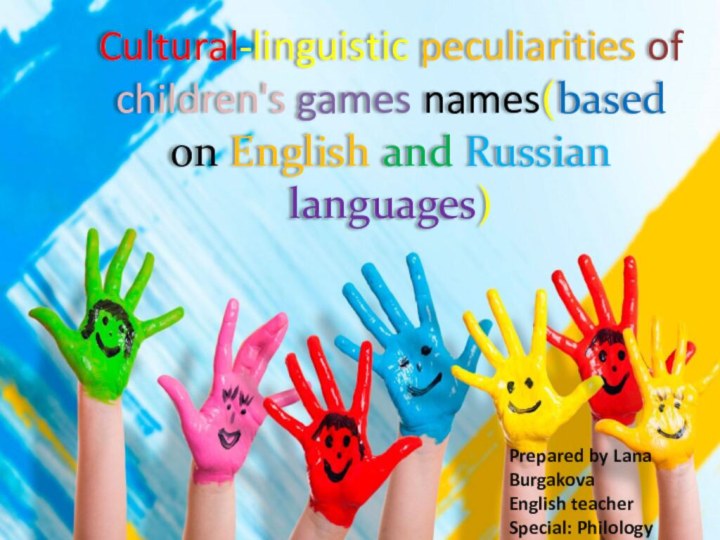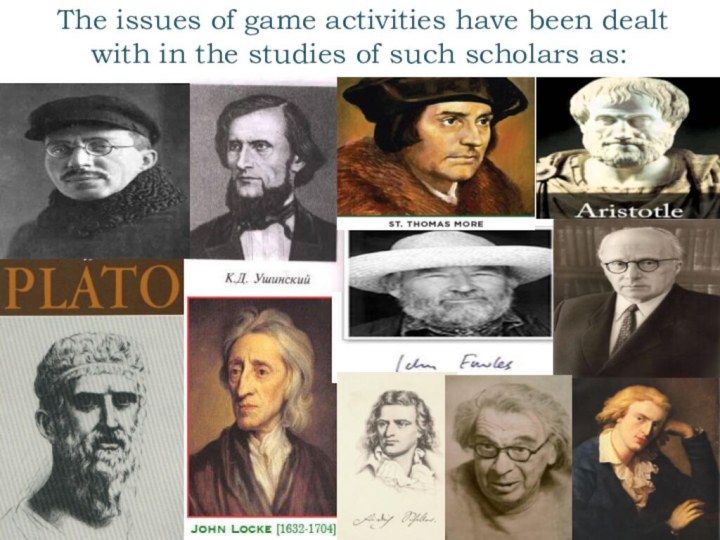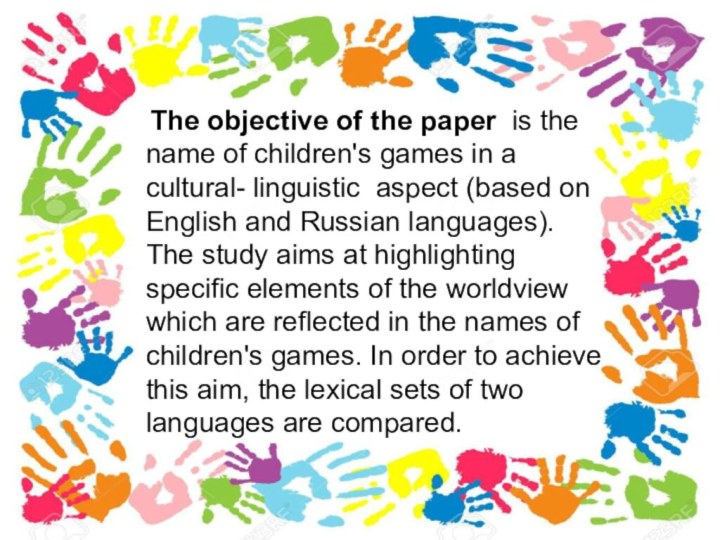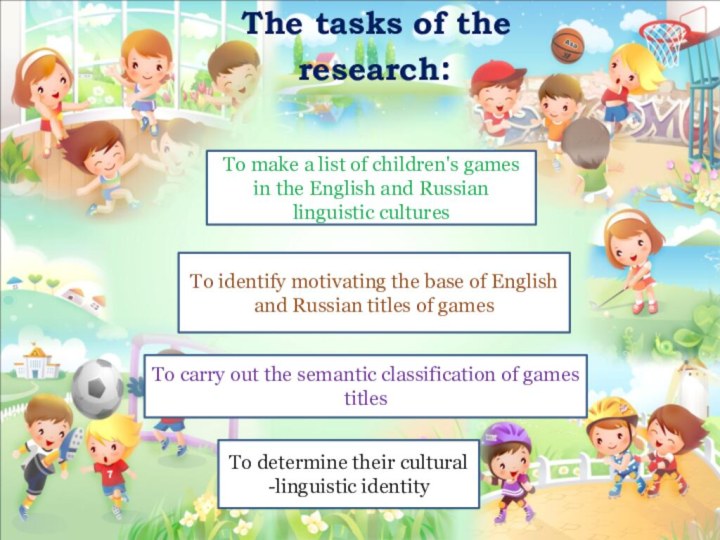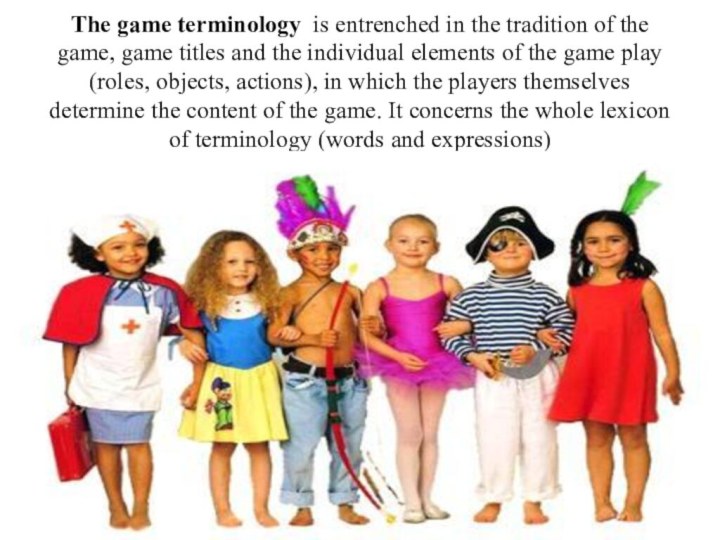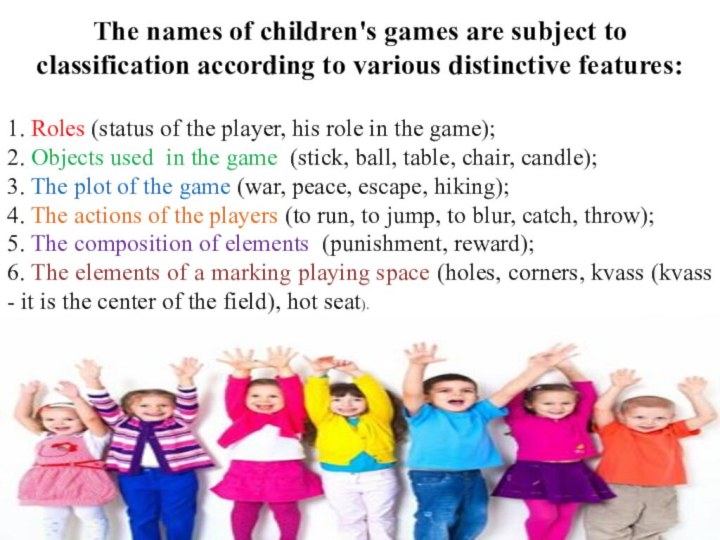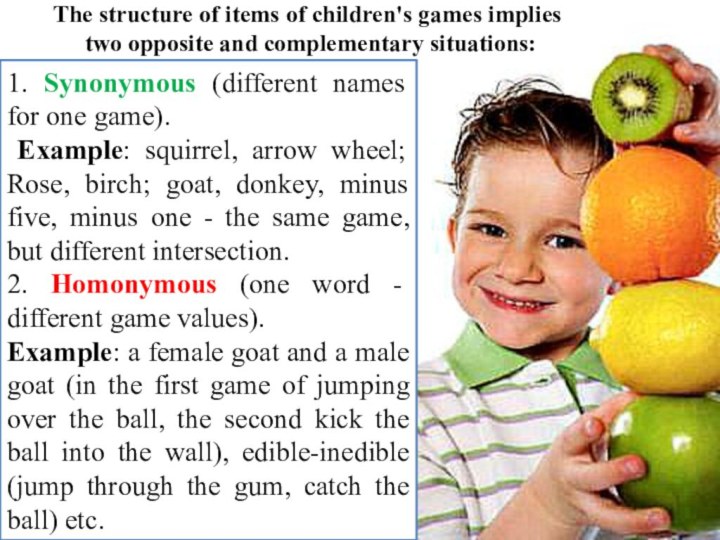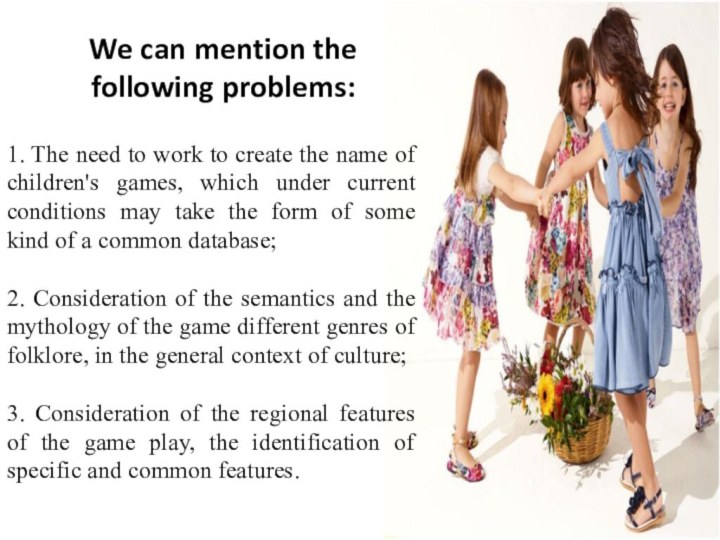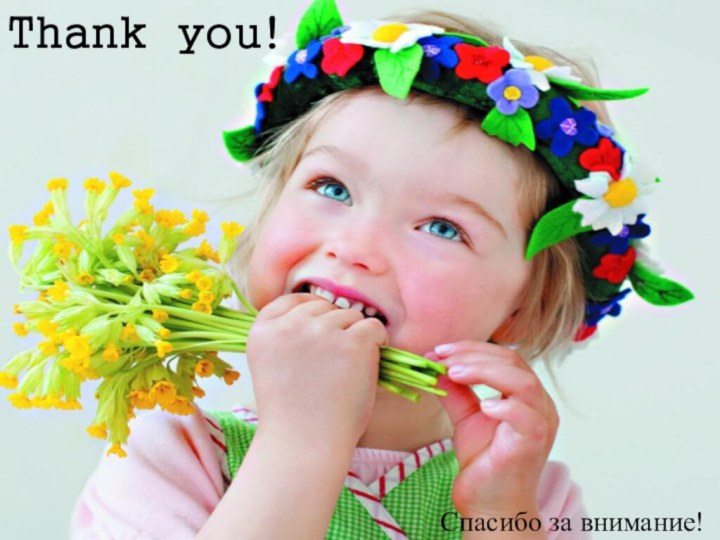Слайд 2
schedule
Introduction
The structure of the work
The games terminology
on a material of Russian and English languages
Classification names
of children's games
Synonyms, homonyms, metaphorical terminology of the games
Conclusion
Bibliography
Слайд 3
Game is an expression of a certain attitude
of personality
to the surrounding reality
(SL Rubinstein).
Слайд 4
The issues of game activities have been
dealt with in the studies of such scholars as:
Слайд 5
The objective of the paper is the
name of children's games in a cultural- linguistic aspect
(based on English and Russian languages). The study aims at highlighting specific elements of the worldview which are reflected in the names of children's games. In order to achieve this aim, the lexical sets of two languages are compared.
Слайд 6
To make a list of children's games in
the English and Russian linguistic cultures
To identify motivating the
base of English and Russian titles of games
To carry out the semantic classification of games titles
To determine their cultural -linguistic identity
The tasks of the research:
Слайд 7
The object of the research: the lexical microsystems
in the English and Russian languages which represent the
names of children’s games.
The subject of research: the universal and specific features of the names of games in English and in Russian names of children’s games.
The theoretical significance of the research: the study under consideration offers certain contribution to the development of the general theory of linguistic-cultural interdependence.
The practical value of the research: it is possible to apply the results of the study in the courses of cultural linguistics, lexicography and cross-cultural communication.
The methods: the comparative method, the definition analysis and etymological analysis have been used in the paper.
The work consists of an introduction, three chapters, conclusion, bibliography, sources of factual data and appendix
The work consists of an introduction, three chapters, concl
usion, bibliography, sources of factual data and appendix.
Слайд 8
To make the study more reliable, several dictionaries
of the English and Russian languages have been used:
Longman
Dictionary of English Language and Culture;
New large English-Russian dictionary in 3 m. (Y.D. Apresian);
Dictionary of Russian language (D.N. Ushakov);
Explanatory Dictionary of Russian Language (V.I. Dahl);
Oxford Advanced Learner's Dictionary of Current English;
Longman Dictionary of Contemporary English;
Webster's third new international dictionary of the English language.
Etymological Dictionary of the English Language (by Dr.E. Klein);
Concise Etymological Dictionary of the English language (by WW Skeat);
Cassell's Modern Guide to Synonyms and related words (by SI Hayakwa).
Слайд 9
The game terminology is entrenched in the tradition
of the game, game titles and the individual elements
of the game play (roles, objects, actions), in which the players themselves determine the content of the game. It concerns the whole lexicon of terminology (words and expressions)
Слайд 10
It should be noted that the English version
of the interpretation of the word game has two
meanings, «Game and Play»
Game
Play
it is children's entertainment, where, playing with toys, they are trying on the role of different character
a time when children enjoy playing with other children, taking a particular position in the team
Слайд 11
Happiness
winning
failure
sharp objects
danger
risk
success
Слайд 12
The names of children's games are subject to
classification according to various distinctive features:
1. Roles (status of
the player, his role in the game);
2. Objects used in the game (stick, ball, table, chair, candle);
3. The plot of the game (war, peace, escape, hiking);
4. The actions of the players (to run, to jump, to blur, catch, throw);
5. The composition of elements (punishment, reward);
6. The elements of a marking playing space (holes, corners, kvass (kvass - it is the center of the field), hot seat).
Слайд 13
Such topics as:
1. Fire and everything connected with
it (burner, poker, fire, pot, fire, furnace, hell, honey,
pig iron, hot potatoes, coal, cold, hot gum) in games like «Run-Freeze», « Snowman »,« Ace-King »,« Hot and Cold »,« hot potato», «Rapid Fire» , «burner», «Sun», etc .;
2. Food (butter, lard, kvass, salt, ham, egg, ball-Salk, honey), «Honey Do you love me?», «Eatable - Uneatable», «Loaf», «Get the apple», etc. .
3. Animals (wolf, hare, deer, donkey, pig, rooster, fox, bear, chicken, rat, forty, a cat, a goat, a sparrow, nightingale, horses, ladybugs, frogs, bull), «Hippo run, run» «Fight of roosters», «Hunting for elk», «The Deer and the shepherds», «Hunting the Wolf», «Animals and Birds», «Two little black birds», «Goat», «The Hawk and Duck», «Cats and mice »,« Duck, duck, goose »,« Grey Bunny», etc .;
Слайд 14
4. The city, garden, mountain (street furniture, lane,
mountain, garden, city), «Marco Polo», «Diamonds in the street»,
«Sea - Ground», «Sex, nose, ceiling», «Brooks and lake», «King of the Hill», etc .;
5. The church, Demonology (pop, monk, bell, angel, heaven, heretic, Baba Yaga, sorcerer, magician, vampire, King Kong, monsters, zombies, Nibbler, the Witch), «White Shaman», «Water», «Witch», «Vampire», «King kong», «Zombie», «Monsters», «Monk in blue trousers», «bell», etc .;
6. Royal majesty (King, Queen, Princess, Count, the Emperor, Prince), «Ace-King-Queen», «Little princess», «Cinderella», «King of the Mountain», «The King and Queen», «Cinderella» etc .;
7. Proper names (Baba, Ali Baba, Olena, Jack,), «Jack», «Ali baba», «Pirates», «Jacks Follow the bouncing ball», «Bob, be Nimble», «Clock», « Marco Polo »,« Mother May I? ».
Слайд 15
The structure of items of children's games implies
two opposite and complementary situations:
1. Synonymous (different names for
one game).
Example: squirrel, arrow wheel; Rose, birch; goat, donkey, minus five, minus one - the same game, but different intersection.
2. Homonymous (one word - different game values).
Example: a female goat and a male goat (in the first game of jumping over the ball, the second kick the ball into the wall), edible-inedible (jump through the gum, catch the ball) etc.
Слайд 16
We can mention the following problems:
1. The need
to work to create the name of children's games,
which under current conditions may take the form of some kind of a common database;
2. Consideration of the semantics and the mythology of the game different genres of folklore, in the general context of culture;
3. Consideration of the regional features of the game play, the identification of specific and common features.
